
Chandrakant Keshavlal Bakshi was a Gujarati author from Gujarat, India and a former Sheriff of Mumbai. He was known for his bold and new concepts in writing during his time in Gujarati literature. He is also addressed as Bakshi or Bakshibabu. Born in Palanpur, he completed higher education and had a business in Calcutta. He started writing there and later moved to Mumbai for his teaching career. He wrote 178 books, and wrote extensively in newspaper columns.
The history of Gujarati literature may be traced to 1000 AD, and this literature has flourished since then to the present. It is unique in having almost no patronage from a ruling dynasty, other than its composers.
Ranjitram Suvarna Chandrak, also known as the Ranjitram Gold Medal, was founded by Gujarat Sahitya Sabha and is considered the highest literary award in Gujarati literature. The award is named after renowned Gujarati writer Ranjitram Mehta. It is awarded since 1928.

Jhaverchand or Zaverchand Kalidas Meghani was an Indian poet, writer, social reformer and freedom fighter. He is a well-known name in the field of Gujarati literature. He was born in Chotila where the Government College has been renamed for this literary figure as Raashtreeya Shaayar Zaverchand Meghani College, Chotila. Mahatma Gandhi spontaneously gave him the title of Raashtreeya Shaayar. Besides this he received many awards like Ranjitram Suvarna Chandrak and Mahida Paaritoshik in literature. He authored more than 100 books. His first book was a translation work of Rabindranath Tagore's called Kathaa-u-Kaahinee titled Kurbani Ni Katha which was first published in 1922. He contributed widely to Gujarati folk literature. He went from village to village in search of folk-lores and published them in various volumes of Saurashtra Ni Rasdhar. He was also the Editor of Phulchhab Newspaper of Janmabhoomi group.

Saraswatichandra is a Gujarati novel by Govardhanram Madhavaram Tripathi, an author of early twentieth century from Gujarat, India. Set in 19th-century India, It is acclaimed as one of the masterpiece of Gujarati literature. Though the novel was published in four parts, each part has a distinct thematic content, its own cast of characters and independent beginnings and ends. It was adapted into several plays, radio plays, films and TV series. It was well received by the number of critics, and was translated into several Indian languages, along with English. However, Suresh Joshi, a strong proponent of formalism theory, criticized the novel for its structural failure.

Chunilal Madia was a Gujarati author from Gujarat, India, primarily known for his novels and short stories set in rural Saurashtra. Recipients of several awards, he is considered one of the leading writers of Gujarati literature.
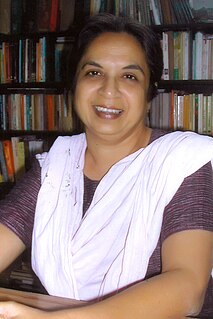
Himanshi Indulal Shelat is a Gujarati author from Gujarat, India. She received Sahitya Akademi Award for Gujarati in 1996 for her short stories collection Andhari Galima Safed Tapakan (1992).
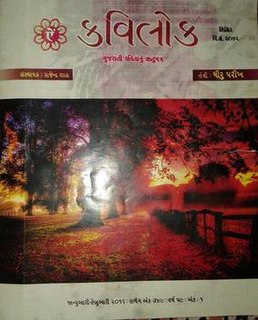
Kavilok, a publication of Kavilok Trust, is a Gujarati language bimonthly poetry journal published in Ahmedabad, Gujarat, India. The current editor is Dhiru Parikh and co-editor is Praful Raval.
The Children's literature in Gujarati language of India has its roots in traditional folk literature, Puranic literature, epics and fables from Sanskrit literature. Following 1830s, the large number of stories and fables adapted and translated from various traditional and western sources started to appear in Gujarati. Led by Gijubhai Badheka and Nanabhai Bhatt, the children's literature expanded rapidly in form of stories, poems, rhymes and riddles. Several authors and poets wrote for children intermittently and exclusively. Large number of magazines catering to children were published by middle of twentieth century. Later adventure novels, science fiction, young-adult fiction were also published. Ramanlal Soni and Jivram Joshi contributed for five decades creating stories, fictional characters and novels. Few children's plays were published while the biographies of historical characters appeared frequently.
Vadilal Jechand Dagli (1926-1985) was Gujarati poet, essayist, leading economist and journalist of India.
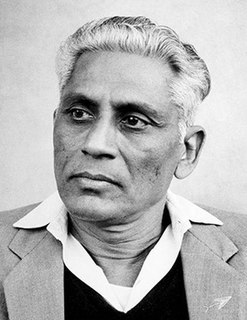
Jayant Himmatlal Pathak was a Gujarati poet and literary critic from Gujarat, India. He was the president of the Gujarati Sahitya Parishad from 1990 – 1991. He received several awards, including the Sahitya Akademi Award, the Kumar Suvarna Chandrak, the Narmad Suvarna Chandrak, the Ranjitram Suvarna Chandrak and the Uma-Snehrashmi Prize. The Jayant Pathak Poetry Award is named after him.
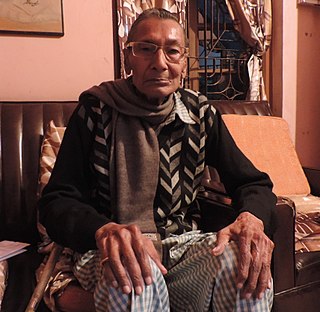
Kishore Kalidas Jadav was a novelist, critic, and short story writer from India. He wrote in Gujarati and was primarily responsible for the development of surreal and experimental Gujarati fiction.

Vijay Ramanlal Shastri is an Indian Gujarati language short story writer, novelist, critic and translator. He was educated and worked at the M. T. B. Arts College in Surat and has written more than two hundred short stories in addition to several works of criticism.
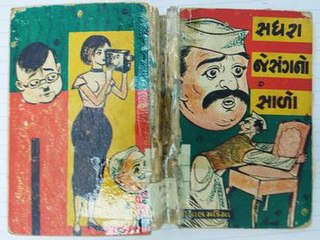
Sadhara Jesang No Salo is a 1962 Gujarati satirical novel in two parts, written by Indian writer Chunilal Madia. The novel narrates a story of Sadharo, a vegetable vendor, who eventually becomes the prime minister of a country.
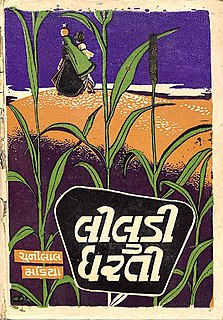
Liludi Dharati is a 1957 Gujarati novel by Chunilal Madia. Though it was written is two parts, its plot is extended with inheritors in another separate novel Shevalna Shatdal (1960). The novel was made into a film by Vallabh Choksi in 1968.

Liludi Dharati is a 1968 Gujarati social drama film directed by Vallabh Choksi. It stars Daizy Irani, Mahesh Desai, Kala Shah, Champshibhai Nagda, Upendra Kumar, Kishore Bhatt, Narahari Jani, Vina Prabhu, Vanalata Mehta. The film was adapted from Gujarati writer Chunilal Madia's novel of the same name. It was the first ORWO colour film of Gujarati cinema.
Jayant Jhaverchand Meghani was an Indian editor, translator and bookman from Gujarat, India. He was the fifth son of Gujarati writer Jhaverchand Meghani whose several works he edited.
Bhogilal Chunilal Gandhi was an Indian scholar, poet, critic, translator, and independence activist from Gujarat, India. He edited Vishvamanav, a Gujarati-language literary-socio-political journal. He wrote biographies of several writers and political figures including Leo Tolstoy, Joseph Stalin, C. Rajagopalachari, Subhas Chandra Bose, Romain Rolland, Durgaram Mehta, and Narmad. He translated many works into Gujarati from English and Bengali languages. In his early years, he came under the influence of Communism, and became an active member of Communist Party of India.

Vaju Kotak was a Gujarati writer, publisher, journalist, and an Indian film director and screenwriter. He primarily worked in Gujarati film industry and in Bollywood during his career span. He is known to be the co-founder of weekly news magazine Chitralekha, published in Gujarati and Marathi.













